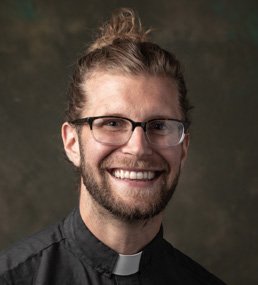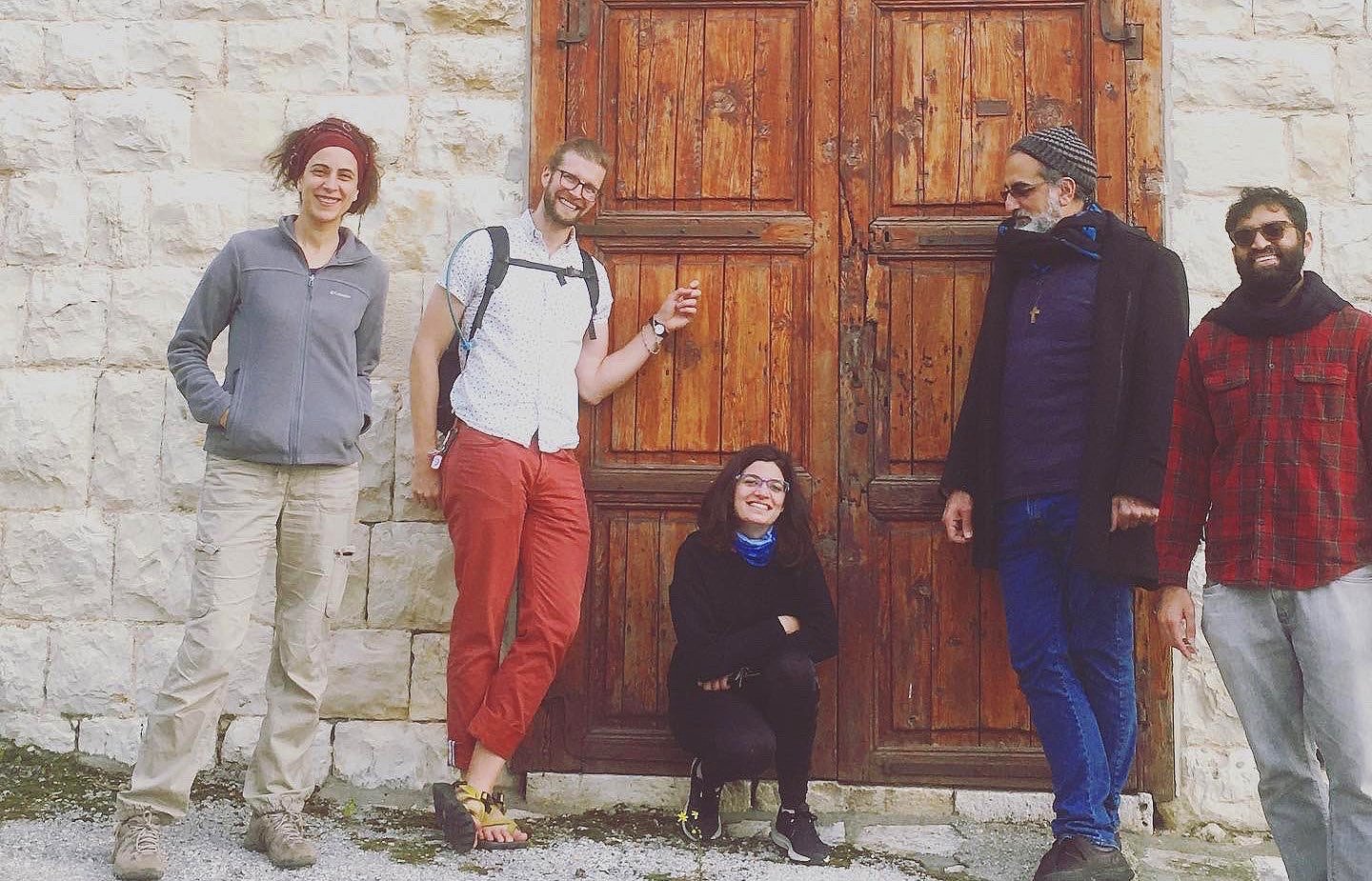
Jesuits search for the words, and the ways, in a foreign land with profound needs
By Mr. Ryan Birjoo, SJ and Fr. Garrett Gundlach, SJ
In the deepening economic-social-political crisis and heightening inter-religious tensions of Lebanon, “Where is God and where’s that grace we’re so desperately asking for?” is basically the shape of my whole unfolding priestly ministry. Thanks be to God (neshkor Allah), we’re praying, listening, chatting, playing, working our ways into answers that all seem to say: here.
MR. RYAN BIRJOO, SJ
Crisis and grace, ministry and limitations. Lebanon has lived through a lot since August of 2020, when we, Midwest Jesuits Ryan Birjoo and Garrett Gundlach, came to Beirut to serve and study. We began with simple Arabic courses before Ryan dove full-time into his regency assignment at Jesuit Refugee Service and Garrett stepped into deeper studies in Arabic and Muslim-Christian relations. Nearly three years later, we want to share two stories that speak to the tensions, trials and graces of our time in Lebanon, and the relationships we developed here.
“Lebanon is a holy land,” says Fr. Gaby, the pastor of the local Maronite church, as I munch on namoura, an almost too-sweet confectionary laced with pistachios and syrup.
His hospitality lightens the shadowy room. The generator has not yet switched on and, alas, it is not the one golden hour of the day when we receive state electricity. We’ve been discussing patriarchs, prophets and evangelical encounters with Syro-Phoenician women, a bit of a tangent, albeit edifying, from the predicament that led me to seek advice from him in the first place. After a few more bites, I start explaining. I tell him I’m working with Jesuit Refugee Service, and that I’m responsible for coordinating the distribution of food baskets to families of students we support in educational programs. The catch is that our donors primarily fund programs for Syrian families and during distributions many Lebanese have been asking for help. Having to explain, in broken Arabic, to widows caring for their grandchildren why we cannot provide food is, to put it mildly, jarring. Hunger devours my paltry explanations. I know that the need is real. The multiple crises unfolding in Lebanon have been difficult for most, but in this area of Beirut, where people were already hard-pressed, hyperinflation has rendered each day an exercise in survival.
As the Lebanese face their crises, I face mine, too: What’s the best way to be faithful to my mission—to serve refugees—in an environment with limited resources? The issue is beyond me as an individual, but in my limited role, I muse on the broader apostolic priority of working with the marginalized.
It’s a puzzle to me. What happens when everyone has suddenly found themselves on the margins? I’m beginning to understand why Fr. Arturo Sosa, SJ, emphasized “spiritual maturity” while working with the poor.
Throughout my time here, I’ve been haunted by the feeling of being limited. And, this is not a bad thing, as it drives me to my knees in prayer. And, it is there that I can feel gratitude for what we are able to do, and entrust shortcomings to God. It is there that a Syro-Phoenician woman enters my thoughts, and this one is not exotic but familiar. I see the Lord reminding me that ministry is broader than our imaginations. Indeed, this is a holy land, not because everything is perfect, but because it’s a place where need is expressed, where God can be argued with, where encounters have the possibility of broadening minds and expanding ministries, where one might find an unexpected sweetness that is simply divine.
Jesuit scholastics Roudy Khalil, Ryan Birjoo, Garrett Gundlach, Tomasz Matyka and Osama Halim during a rare opportunity for a snowball fight near Jounieh.
Mr. Ryan Birjoo, SJ, is completing his third year of regency with the Jesuit Refugee Service in Beirut. Three words that characterize his time as a Jesuit are gratitude, discipleship and awe.
Fr. Garrett Gundlach, SJ, is a new Jesuit priest (ordained in 2021) whose formation has brought him through an MSW, the Pine Ridge Indian Reservation, Paris and now Beirut for special studies.
Jesuits Garrett Gundlach, Ronney El Gemayel and Ryan Birjoo with hiking friends beside a historic church door near the town of Gharzouz.
FR. GARRETT GUNDLACH, SJ
In Lebanese Arabic, God is everywhere in the daily parlance. He is the giver, the taker and the master of any hope or heaviness beyond us. Phrases include If God wills it, if God desires it, may God give you life, God deliver us, and God forgive you or God straight-up TAKE you. Yet another phrase stops me every time, kattar khair Allah, or هللا ريخ رّتك in the local alphabet. Its ambiguous translation betrays its ambiguous gratitude. God has given so much good sounds almost like God has given too much good, which sounds almost like God’s not giving much anymore. It begs a consoling response when it’s uttered in a sinking tone, without a smile, in the refugee camp, or over coffee waiting for the food bag distribution, or after Mass with the migrant workers, or in a chat with overwhelmed college kids and the priests, brothers or sisters accompanying them: Keefna (How are we)? Kattar khair Allah (We’re living off old graces. Thank God they once were many because we’re not feeling them these days).
In the deepening economic-social-political crisis and heightening inter-religious tensions of Lebanon, “Where is God and where’s that grace we’re so desperately asking for?” is basically the shape of my whole unfolding priestly ministry. Thanks be to God (neshkor Allah), we’re praying, listening, chatting, playing, working our ways into answers that all seem to say: here.
Despite the despair, God is here, at work, discernible enough to urge our own work in community committees for college kid summer camps, faith formation weekends, migrant worker combo Mass-lunch-cultural shows or stop-the-madness long, Sunday-night socials after prayer. Project by project, my young priesthood’s been swept into this hunt to embody the hope that is not falling from the sky but instead seems to be emerging from within. Project by project, I’m being called into places I don’t feel ready for, in languages and cultures I think I don’t know well enough but quickly discover I at least barely do, which is enough to dive in. Project by project, alongside my Muslim-Christian studies and my desperate, daily Arabic vocab work, I juggle exhaustion, exhilaration and encouragement that we’re doing our best with what God is giving, not too much and just barely enough, and somehow that cuts it, or as the phrase goes, kattar khair Allah.






